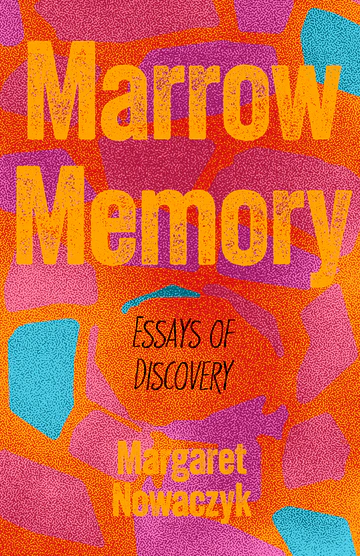
Marrow Memory: Essays of Discovery
Margaret Nowaczyk
Wolsak & Wynn, 2024
Review by Stephanie Cesca
Could Dostoyevsky be the answer to receiving an accurate medical diagnosis? As Margaret Nowaczyk explains in Marrow Memory, her beautifully written and compelling collection of essays, this may be the case.
A pediatric clinical geneticist and professor at McMaster University and DeGroote School of Medicine, Nowaczyk shares many fascinating insights – though not all of them are medical in nature. Instead, she explores different parts of her life, moving gracefully between the scientific and the personal throughout the collection.
These essays reflect the workings of her mind, “the marrow” of her being. As such, the name serves as a metaphor for her deepest self. And deep Nowaczyk goes, sharing many aspects of her role as a physician and scientist, but also as a “woman, a mother, a wife, an emigrant, and a suffering mind.”
On the professional side, Nowaczyk gives readers a considerable amount of insight into the life of a doctor who sees the stuff of parents’ nightmares. Raw and real, her stories appear to have no boundaries. She brings us into the autopsy suite, where she examines a severely malformed fetus. She brings us into the emergency department, where she watches a 17-year-old girl die. In one particularly heartbreaking scene, she brings us into the neonatal intensive care unit, where she’s asked by a grieving father to walk through the features that led her to diagnose his newborn daughter with trisomy 18.
What she doesn’t do is sanitize her language with euphemisms or try to find beauty where there is none. Instead, she opts for honesty – her clear and crisp writing style reflects that.
While Nowaczyk describes medicine as a key part of her life, experiences and memories give it meaning. She shares so much more about who she is as a person. From struggling to learn English as a newcomer to Canada, to searching for answers about her genealogy, to travelling with complaining children on a month-long trip to her homeland of Poland, we witness much about her upbringing and family. She shares the complexities of her relationship with her parents and past boyfriends. There’s a lot to say, and some of it is quite painful. But that’s the beauty of this book – that Nowaczyk doesn’t shy away from truths, no matter how uncomfortable. Instead, Marrow Memory digs deep into the nooks and crannies of our existence, places that can be difficult to visit but essential to who we are.
Particularly poignant is her fascination with memory – how we react to it, interpret it, and how it changes us literally and figuratively. While Nowaczyk the storyteller explores how lived experiences shape who we are as people, Nowaczyk the scientist explains how that happens. Experiences, she writes, can modify our DNA. “Memories can be written not in the genes themselves, but onto them, as epigenetic changes … The English have a term for it: ‘what’s bred in the bone.’ I call it marrow memory.”
Despite the wide variation in subject matter, these essays are bound together by one thing: Nowaczyk’s love of language. Whether she’s writing about family, science, Poland or herself, she often ties it back to the written word. This love and appreciation of language are the threads that tie each of these essays together, weaving them into such a memorable collection.
Now, back to Dostoyevsky – how could there be a connection with receiving a correct medical diagnosis? In her essay ‘Reading Dostoyevsky in New York City,’ Nowaczyk recounts her efforts to analyze a short story by the Russian writer while attending a workshop. The goal of this workshop was to learn more about narrative medicine, an approach that views patients as “texts to be read, pondered, and respected.” The objective was to help doctors make correct diagnoses and improve patient care.
Here, Nowaczyk discusses the value of close reading, a tool that leads to a deeper understanding of a piece of writing. “By questioning the plot, the identity of the narrator, his desire, and the timeline of this complex story we were training ourselves to listen better and to hear the stories being told to us.”
The average person will have to take her word for it, but from a reader’s standpoint, this exercise probably had another benefit – and that is compelling storytelling. Reading Marrow Memory was an immersive experience that drew this reader in, kept her engaged and impressed her with its captivating prose.
________________________________________________________________________________________________________________
Stephanie Cesca is a writer and editor based in Toronto. Her debut novel, Dotted Lines, will be published by Guernica Editions in October 2024. Find her on Instagram.